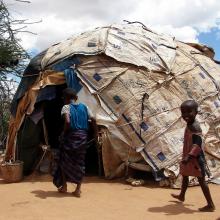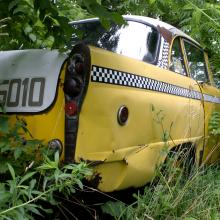Kenya
THIS YEAR, THE seasonal rains in Kenya came two months late. “Even the weatherman can’t forecast the weather,” Stephen Katama, a local shopkeeper in Nairobi, told me when I traveled to East Africa in June. “We can’t tell the difference between the summer and winter here anymore.”
During the past two decades, rain in sub-Saharan Africa has increased in frequency and intensity, creating dangerously erratic patterns of rainfall and drought. A single day’s downpour may bring the amount of rainfall normally expected over a period of eight months, wreaking havoc on the livelihoods of countless subsistence farming families across Kenya and Uganda.
Sub-Saharan Africa is among the regions projected to see the worst of climate change in the coming decades. I traveled with the Climate Witness Project, hosted by the Christian Reformed Church in the U.S., to Nakuru, Kenya, and North Teso and Soroti, Uganda, to visit farming communities facing extreme shifts in weather patterns.
“I think it’s important that we do not let the interest in Black Panther go without harnessing that moment to transform it from just a cultural movement into a sustained movement,” he said.
The Academy Award nomination was a cause for celebration throughout the country. President Uhuru Kenyatta tweeted after the 90th Oscars ceremony in Los Angeles on March 4: “You have won our hearts as a nation … Keep telling our stories through your camera and you will win next time.”
Even many within the Christian universities said they grew too fast, did not allocate money well — or both.
AIDS killed his wife in 2013, and his 13-year-old daughter the next year. And when his flock found out that Mutuse himself tested positive for HIV, the virus that causes AIDS, many abandoned him — and some thought his diagnosis justified the burning of his church.
"They want their supporters to believe this is a divine call, which is not. I think they are manipulating their supporters," said the Rev. Wilybard Lagho, the Mombasa Roman Catholic archdiocese vicar general.
The drought in the Sahel — a region that forms a dry belt across northern Africa — has left millions without any water to drink, and is being linked to three deaths in recent days in Kenya, due to consumption of unsafe water.
“There are no drops to reduce, recycle, or reuse,” said professor Jesse Mugambi, of the University of Nairobi, who added that many in the region are spending World Water Day “praying for drops of rain to quench their thirst and that of their livestock.”

Dadaab refugee camp. Image via Bjørn Heidenstrøm/Flickr.
In Dadaab refugee camp, a researcher recorded a Somali term for the particular feeling of longing for resettlement: buufis, “a kind of depression rooted in an inextinguishable hope for a life elsewhere that simultaneously casts the present into shadow.”
Clutching a Bible in one hand and a walking stick in the other, Pastor Stephen Lenku Tipatet traverses the plains of Kajiado County, fighting female circumcision and propounding on the Christian gospel.
The region is the homeland of the Maasai, an indigenous community in Southern Kenya and northern Tanzania. The community has resisted modernity and Western influences, and clings to their traditional way of life, including the practice of female genital mutilation, or FGM.
At the Thatha Roman Catholic Mission, part of the Machakos Diocese, the Rev. Gerard Matolo increasingly sees more people seeking help.
“You can’t tell them that there is nothing,” Matolo said. “As their shepherd, I have to find a way to ensure they get something to eat. Sometimes I share my own food.”
Roman Catholic bishops in Rwanda have issued an apology for the role played by individual clergy and church members, in the 1994 genocide in which nearly 1 million ethnic Tutsis and Hutus were killed.
On Nov. 20, the apology was read aloud in all Catholic churches, in the local Kinyarwanda dialect. It came at the end of Pope Francis’ Jubilee Year of Mercy.
Even by this pope’s standards it was a bold move.
Francis, the spiritual leader of more than a billion Roman Catholics across the globe, this week traveled to Sweden, one of the most secularized countries in Europe, to take part in events marking 500 years since Martin Luther kickstarted the Protestant Reformation.

Image via Michelle D. Milliman / Shutterstock.com
A lawyer for the Christian legal aid group International Justice Mission (IJM) has disappeared, and was last seen locked in a metal container with his client yelling for help, reports The New York Times.
Willie Kimani, a lawyer in Nairobi, Kenya, was representing the motorcycle taxi driver Josephat Mwenda in a case against a police officer who had shot him accidentally, and when Mwenda complained, retaliated by accusing Mwenda of a variety of false charges. Despite the harassment, Mwenda pursued the complaint in court.

Image via Fredrick Nzwili / RNS
An Anglican priest has joined two gay men and two lesbians in a suit against the state over discriminatory laws that they see as encroaching on the rights and freedoms of sexual minorities in the East African country.
The Rev. Mark Odhiambo and the other plaintiffs charge that gays and lesbians in Kenya are routinely attacked, raped, evicted from their homes, and arbitrarily arrested. Odhiambo is a curate, or assistant to the parish priest, in Maseno South, a diocese on the shores of Lake Victoria.

Archbishop-elect Jackson Nasoore Ole Sapit. Image via Fredrick Nzwili / RNS
Bishop Jackson Nasoore Ole Sapit, a traditionalist who nonetheless steered clear of gay issues, has been elected the new archbishop of Kenya.
Ole Sapit, 52, who headed Kericho Diocese in western Kenya, will replace outgoing Archbishop Eliud Wabukala and also serve as bishop of All Saints Cathedral, the national seat of the Anglican Church.
IN DECEMBER 2007, Naomi Mwangi, a Christian, fled her home in Kisumu, Kenya, as men with machetes attacked towns across the region. For five weeks violence raged nationwide. When the bloodshed ended, more than 1,300 Kenyans were dead and another 650,000 had been displaced. Mwangi and her family ended up living in the Maai Mahiu refugee camp, south of Nairobi. She was 12 years old.
Mwangi is coming of age in a society with ethnic violence in the background, extremist violence in the foreground, and massive economic inequality. Africa has the highest concentration of young people in the world and more than half of them are unemployed. Mwangi wanted something different—she wanted to work for peace.
Now 21, Mwangi is a leader in grassroots peacemaking campaigns that seek to end conflicts between the 42 ethnic groups in this majority-Christian country. The 2007 election violence pitted Christian against Christian, as ethnic ties trumped religious affiliation. Even now, during elections, Mwangi told Sojourners, “Leaders motivate youth to join in the political crisis ... to fight against another tribe.”
A major obstacle to social and economic stability among youth in Kenya is unequal distribution of government-issued identification cards. Kenyans need ID cards for everything from voting and university enrollment to obtaining grants for entrepreneurship programs. But historically, the ruling government doled them out as political favors, and they’ve often been denied to members of minority groups.
“There are plenty of applications at election time,” Mwangi said, explaining that the ID process is slowed down or delayed when it seems one ethnic group could tip the chances of a politician who represents a different group.

Image via Fredrick Nzwili / RNS
A Catholic priest has denounced the killings of two legendary lions, one violently speared by a Maasai warrior, outside the city’s famous national park. Lions and other wildlife roam freely in the wild in the 45 square-mile Nairobi National Park. A popular tourist destination, the park is only a short drive from the central business district and has earned Nairobi the distinction of the world’s wildlife capital.

Image via Fredrick Nzwili / RNS
Across Africa, many people believe mental illness is caused by curses, witchcraft, or demons. In such places, traditional medicine has long remained the first line of treatment. But a novel program in Eastern Kenya is working to change those perceptions and help the mentally ill receive better care.

Archbishop Eliud Wabukala. Image via Fredrick Nzwili / RNS
The Anglican Church in Kenya has become the latest province to announce it will boycott the Anglican Consultative Council meeting in Zambia over the participation of the Episcopal Church. The Episcopal Church was recently censured at a primates’ meeting in Canterbury, England, because of the American church’s willingness to ordain and marry LGBT people. According to the sanctions, the Episcopal Church cannot represent the communion at the April meeting or vote on doctrine and polity.

Image via REUTERS/Noor Khamis/RNS
A Muslim man who shielded Christians after a passenger bus was ambushed by suspected al-Shabab militants is being saluted as a symbol of unity. Salah Farah, a schoolteacher, died Jan.18 in Nairobi, where he was airlifted after being shot in the arm and hip when he resisted militant demands that he identify Christians on the bus during the December attack.











